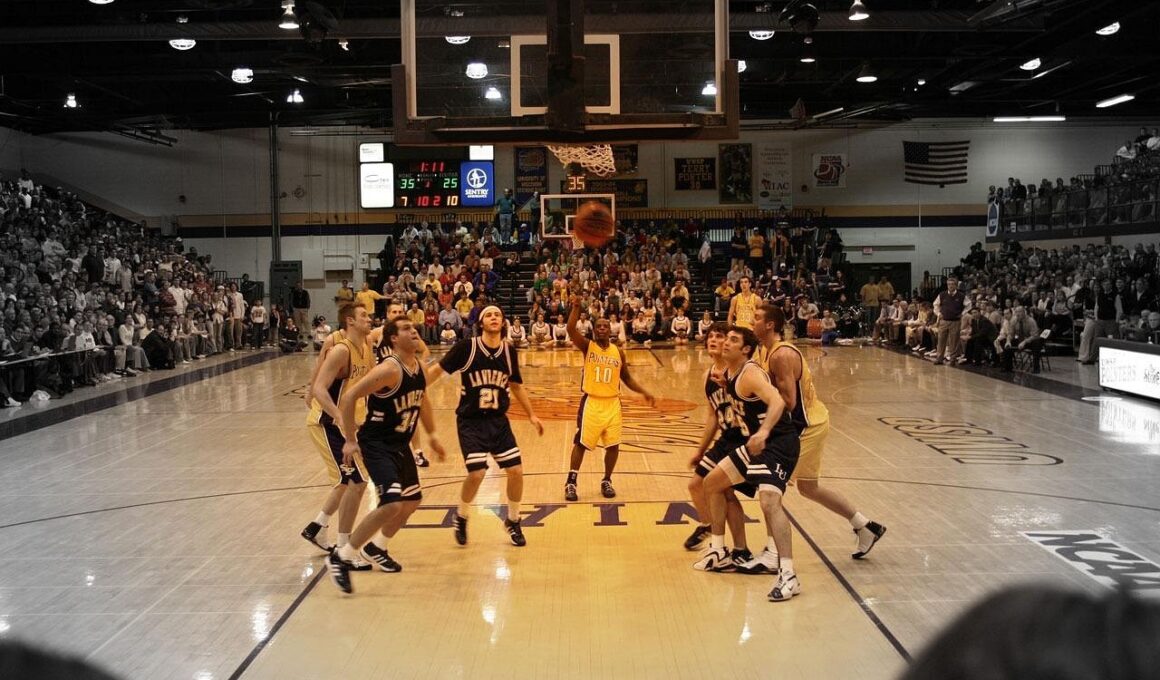Essential Drills for Tournament Readiness
To achieve success in basketball tournaments, players must consistently focus on their fundamental skills. The key areas of development entail dribbling, shooting, and passing. Start with dribbling exercises, ensuring players master different techniques such as crossover movements, spin moves, and hesitation dribbles. These moves enhance on-court agility and help break through defensive setups. Next, practice shooting drills that concentrate on form, speed, and accuracy. Position players vary their shooting spots, emphasizing layups, free throws, and jump shots. Conducting shooting competitions fosters a competitive spirit while honing precision under pressure. Lastly, passing drills improve team coordination. Players should engage in fast-paced passing webs and relay races, promoting accuracy and speed during game situations. These combinations of drills enhance individual skills while fostering teamwork. Classic drills should be infused with creativity and paired with strategic thinking exercises. Additional activities like watching professional games can deepen understanding. Encourage players to note techniques utilized by athletes during critical game moments. Ultimately, these drills create well-rounded players ready to tackle tough tournament settings. Engaging in a disciplined practice routine advances skill levels and bolsters confidence, which often translates into better overall performance in competitive environments.
When preparing for tournaments, one must prioritize conditioning. Players should focus on their physical fitness, as stamina elevates game performance levels. A combination of strength training, agility drills, and endurance running should be integrated into training schedules. Consider high-intensity interval training to develop cardiovascular endurance while maintaining quick bursts of energy, which are crucial during games. Each session should begin with dynamic warm-ups to prevent injury and promote flexibility in crucial muscle groups. Incorporate basketball-specific movements into conditioning routines. Sprinting drills that mimic game situations, including quick cuts and directional changes, enhance players’ reactions during competitions. Furthermore, active recovery sessions, such as yoga or swimming, complement high-intensity workouts. These activities aid muscle recovery while promoting flexibility and balance. Hydration and nutrition play significant roles in conditioning too. Players should maintain healthy diets rich in proteins, carbohydrates, and vitamins to fuel their bodies effectively. Nutrition planning around game days is essential for optimal performance levels. Athletes need to eat balanced meals leading up to tournaments. Include carbohydrates for energy, lean proteins for recovery, and plenty of fruits and vegetables for overall health. Competition, combined with physical readiness, equips players for peak performance when it matters most.
Team Communication and Strategy
Team dynamics greatly influence the outcome of tournament games. Encouraging open communication among players leads to a better understanding of teamwork standards. Establish clear roles for each player based on their strengths. For example, designating a primary ball handler, defensive specialist, or shooting expert to facilitate smoother gameplay. Effective communication also encompasses executing calls and plays during high-pressure situations. Players should practice calling out screens, switches, and fast-break opportunities. Having established signals can streamline coordination and enhance on-court responsiveness. Furthermore, engage in strategic session meetings to brainstorm tactics tailored to opponents’ techniques. Analyze previous games to determine their weaknesses and strengths. Scouting opposing teams offers invaluable insights. Implementing game strategies wherein players interchange roles encourages adaptability, making it difficult for opposing defenses to predict movements. Regularly revising play strategies ensures the team remains ahead of competition by continuously evolving. A unified team with compatible communication fosters an environment wherein players feel empowered to contribute during intense moments. Develop problem-solving skills within the team to create formidable barriers against opponents. A well-prepared team that collaborates in tournament settings showcases their commitment to excellence through adaptability and shared understanding of goals.
Keen focus on mental toughness provides a significant edge in basketball tournaments. Developing this quality demands consistent practice and self-awareness. Utilize visualization techniques, enabling players to imagine themselves successfully executing pivotal plays during intense game moments. This practice builds confidence while reducing anxiety. Incorporate mindfulness meditation practices into training sessions. These techniques help athletes manage stress, maintain composure, and ultimately enhance performance under duress. Conduct situational drills replicating high-pressure scenarios that players may face during competitions to adequately prepare them mentally. Encourage resilience by emphasizing the importance of learning from failures. Discuss past tournament challenges as a team, analyzing what worked and what didn’t. Such conversations foster a culture of growth and improvement, vital in preparing for future competitions. Encourage players to set personal and team goals. Clear objectives maintain motivation levels while establishing standards that the team aspires to meet. Lastly, ensure regular feedback encourages athletes to stay aware of their mental and emotional states throughout training and games. A team that thrives on both mental and physical readiness often exits tournaments with positive experiences, regardless of their overall success.
Game-Specific Skills
To excel in tournament play, refining game-specific skills becomes essential. Skills such as shot selection, defensive positioning, and rebounding must be a focus. Begin with shot selection drills, educating players on recognizing ideal shooting opportunities during games. Players should be aware of teammate positioning and defensive pressure while making quick decisions. Utilize scenarios wherein players practice deciding whether to shoot, pass, or dribble. Incorporating defensive drills emphasizes how to react to opponents offensively. Focus on one-on-one situations where players learn to read and react effectively. Using ball screen defenses improves players’ ability to defend against diverse offensive strategies. Rebounding practice is critical for gaining possession during tournaments. Conduct drills emphasizing the importance of boxing out opponents and pursuing the basketball aggressively. Team drills should coordinate offensive and defensive rebounding efforts to maintain fluid game transitions. Ensure that every athlete understands the importance of each play in overall team performance. Establishing a culture of diligence regarding game-specific skills will prepare players for fierce competition. Effective skill application during matches solidifies individuals’ contributions to overall games while teams cultivate cohesion and strategic fluidity.
Encouragement of analysis through video study significantly improves players’ understanding of their skills and areas needing improvement. Reviewing game footage allows players to track individual progression and identify patterns in their performance. Highlight successful plays alongside moments requiring adjustments to instill a balanced perspective on development. Encourage players to jot down notes on their strengths after observing themselves play or reviewing others. Critiquing performances can deepen understanding of what strategies resonate positively or negatively during actual games. Furthermore, invite coaches to guide analytical sessions, offering professional insights into overall game performance. Analyze both victorious and challenging matches to equip players with diverse experiences for better preparation. Discuss the execution of plays, understanding defensive strategies, and evaluating teamwork dynamics within the context of the game. Additionally, foster player-led review sessions where they can share thoughts and tips on performance. Collaborative learning deepens bonds among teammates while helping everyone gain new perspectives on their games. Effective use of video resources can lead to breakthroughs in skills and game comprehension. In tournaments where split-second decisions are often crucial, players equipped with strong analytical skills excel in adapting to their opponents.
Conclusion and Mindset for Success
The final component of becoming tournament-ready involves developing a robust mindset to embrace challenges and victories. Cultivating a growth-focused mentality allows players to strengthen their overall performance. Emphasizing the importance of effort over outcome fosters resilience through adversity. Recognize and celebrate individual achievements while stressing the significance of teamwork throughout tournaments. Direct communication promotes camaraderie, encouraging a supportive environment where athletes lean on one another. Reinforce the notion that despite wins or losses during competitions, each experience contributes to their overall journey. Encourage players to view setbacks as learning moments and develop habits letting go of negativity post-game. Establishing a routine that includes skills practice, team bonding, and moments of reflection fosters a well-rounded athlete. As competitions approach, maintain motivation levels by reminding players of their aspirations and shared goals. Keeping the end goal in mind ensures focus and dedication amidst tournament challenges. Ultimately, a combination of physical readiness, mental strength, and teamwork enables athletes to confront every challenge head-on during tournaments. As they strive for tournament success, instill pride and purpose within each player, ensuring their performance reflects hard work and passion.
To achieve success in basketball tournaments, players must consistently focus on their fundamental skills. The key areas of development entail dribbling, shooting, and passing. Start with dribbling exercises, ensuring players master different techniques such as crossover movements, spin moves, and hesitation dribbles. These moves enhance on-court agility and help break through defensive setups. Next, practice shooting drills that concentrate on form, speed, and accuracy. Position players vary their shooting spots, emphasizing layups, free throws, and jump shots. Conducting shooting competitions fosters a competitive spirit while honing precision under pressure. Lastly, passing drills improve team coordination. Players should engage in fast-paced passing webs and relay races, promoting accuracy and speed during game situations. These combinations of drills enhance individual skills while fostering teamwork. Classic drills should be infused with creativity and paired with strategic thinking exercises. Additional activities like watching professional games can deepen understanding. Encourage players to note techniques utilized by athletes during critical game moments. Ultimately, these drills create well-rounded players ready to tackle tough tournament settings. Engaging in a disciplined practice routine advances skill levels and bolsters confidence, which often translates into better overall performance in competitive environments.


